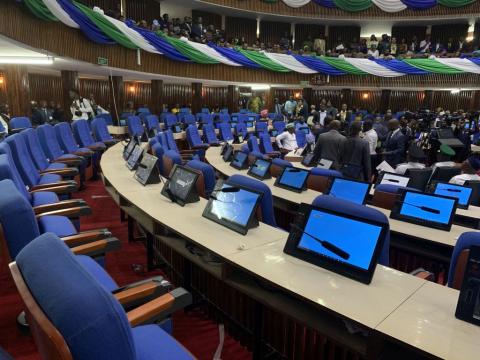By Abdulai Khanja Jalloh
The reason Sierra Leoneans are clamoring for 23 July to be recognized as Media Freedom Day is that on this day in 2020, the Parliament of Sierra Leone repealed the criminal and seditious libel provisions of the Public Order Act of 1965, extensively debated and unanimously passed into law the Independent Media Commission (IMC) Amendment Act 2020.
The obnoxious law was enacted 55 years ago under the regime of Sir Albert Margai’s SLPP-led government. Since then government after government has used the law against the media in Sierra Leone to silence critics. Under the provisions of Part 5 of the Public Order Act 1965, a journalist is guilty until they are proven innocent by a court, and the truth under this law is considered as no defense.
Celebrating this landmark piece of legislation, the Media Reform and Coordinating Group (MRCG) of which the Sierra Leone Association of Journalists (SLAJ) is a member, commended His Excellency President Dr. Julius Maada Bio for fulfilling a manifesto promise. They also commended the Minister of Information and Communications Honorable Mohamed Rahman Swaray for successfully leading the process and piloting the bills, the Speaker and leaders of Parliament, Members of Parliament (on all sides of the Isle), the past leaderships and current SLAJ President and all stakeholders for a job well done. And frankly, all of us, including media personalities like Hon I B Kargbo, Julius Spencer, Emmanuel Saffa Abdulai, Kelvin Lewis, Umaru Fofana, George Khoryama, Ahmed Nasralla, Dr Francis Sowa and our fallen heroes Olu Ritchie Gordon, Pious Foray, Hon Kposowa, K. Roy Stevens and the late Ibrahim Samura, all of whose names deserve to be inscribed in a plaque in a SLAJ Hall of Fame. Bravo and well done.
Coming events, they say, cast their shadows. When President Ahmad Tejan Kabba, of blessed memory, was addressing the thorny border issue of Yenga, the people of Koindu could not allow him to land when he started by saying: “Yenga belongs to Sierra Leone but …” As far as the people of Koindu were concerned Yenga belongs to Sierra Leone. Period or full stop. And the rest should be history.
Several years down memory lane the Honorable Vice President Dr. Mohamed Juldeh Jalloh mentioned at the SLAJ Triennial Meeting on 12 July 2019 that the Government would relax the Libel Laws. Unlike the people of Yenga, my observation was that the 300 or so journalists present at the opening ceremony were busy applauding the Hon. VP for pledging to relax the laws on libel to an extent that they may not have paid keen attention to the conjunction and the addendum of the representative of the President. The Vice President’s full statement reads: “The Government will relax the Libel Laws but with an alternative because they are going to package and repackage it so that there would still be a law to guide the work of the media.”
If we were to benefit from “
Some MPs were more forthright with their views when they said there was no way they could discuss a repeal of Part 5 of the 1965 Public Order Act without guaranteeing safeguards for the practice of responsible journalism in the “public interest”. Consequently while SLAJ might have outright won the war on the repeal of the draconian law relating to press freedom, they have certainly taken some thrashing in key sections of the
Overall, the IMC has been given more powers to be able to regulate the media in Sierra Leone. The stiff fines for abrogating the
During the debate of the IMC bill at the Committee stage, facilitated by the Legislative Committee Chairman, Hon. Hindolo Ngevao, several dicey issues came up - among them the expansion of the membership of the Commission to include representatives from the Inter-Religious Council and civil society and more interestingly the definition of “public interest”. Kudos to Parliament for displaying maturity when after a very long debate, they limited the participation of the religious community to one, instead of two, to make room for the civil society CSO representation. It was a shame, though, that given the proliferation of umbrella civil society organizations, Parliament was unable to pinpoint the genuine voice of CSOs but had to settle for one nominee from a media-related CSO. This is clearly a lacuna to be addressed by civil society, going forward.
The one area that justice was not seen to have been done is the failure of the House to define what public interest is. In the wisdom of the Speaker, and by consensus the whole House, defining public interest at that moment would have been futile as it is very subjective and can mean different things to different people. And much to the delight of SLAJ, the phraseology public interest was unanimously deleted from the IMC bill by the Parliamentarians. It should be gratifying to note that the original intent of the bill was to give IMC sweeping powers to even shut down a defaulting media house if the commission thought doing so would be in the “public interest”. But the million dollar question would have been “who determines ‘public interest’?”
However, it is still incumbent on Parliament – in one of their rare quiet moments – to peruse the full meaning of “public interest” as this phrase appears in several provisions of many of our laws.
Bravo Members of Parliament.
Note: The writer Abdulai Khanja Jalloh is a Media Practitioner and doubles as the Program Manager of the Lady Ellen Women’s Aid Foundation (LEWAF) - a Gender-Based Community Justice Service Provider.
Copyright © 2020 Politico Online








